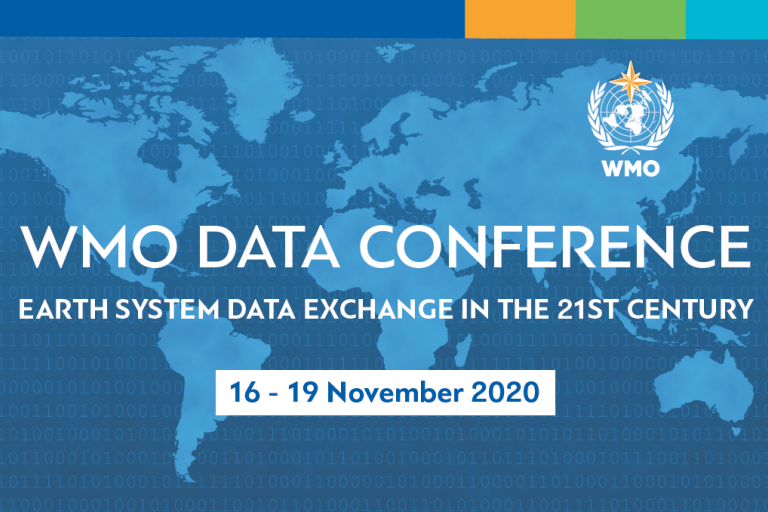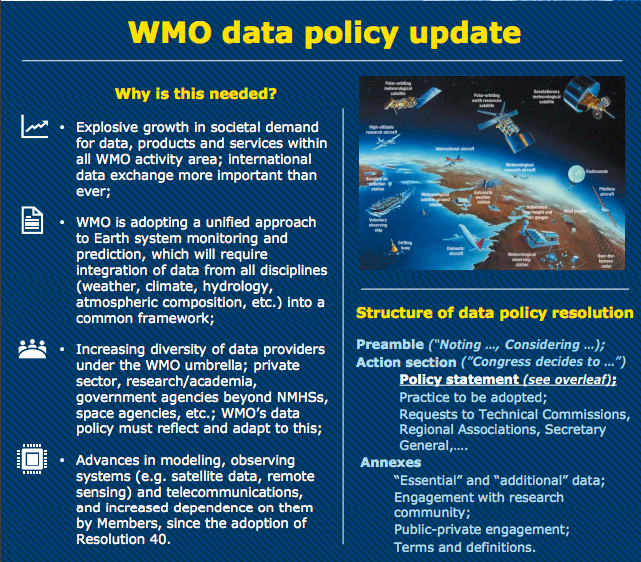WMO Reviews Data Policy
The World Meteorological Organization (WMO) has promoted free and open exchange of weather, climate and water data since 1873, and has created a global standardized network, which is the cornerstone of weather, climate and hydrological services. Lack of data from several regions has a negative impact on accuracy of early warning services globally, but especially in data sparse regions.

Increased availability of Earth observation data would enhance the quality of weather, climate and hydrological services worldwide
Geneva, 16 November 2020 (WMO) – The World Meteorological Organization (WMO) has promoted free and open exchange of weather, climate and water data since 1873, and has created a global standardized network, which is the cornerstone of weather, climate and hydrological services. Lack of data from several regions has a negative impact on accuracy of early warning services globally, but especially in data sparse regions.
The international data exchange practice and policy, which defines the free flow of observations around the globe, has evolved significantly over this period. But now, its robustness and its relevance are being tested by the enormous, transformative change in data, science, and technology and the rapid growth of the private sector. There is a need to share additional data types such as weather radar data, that have not been exchanged before, and to take into account the changing role of the private sector.
WMO is therefore convening a virtual Data Conference: Exchange of Earth System Data in the 21st Century, from 16-19 November 2020 to consider how best to keep the flow of observations going and drive future global policy and practice. The goal is to reach a common understanding on the updated roles, requirements, and rules for the international exchange of observations and other data for monitoring and prediction.
Representatives from National Meteorological and Hydrological Services, United Nations agencies and international organizations, space agencies, the private sector, global data users, academia, and development partner organizations are due to participate.
“The World Meteorological Organization and its predecessor, the International Meteorological Organization, have coordinated and regulated the free and unrestricted international exchange of observations and other meteorological data for the last 150 years. This has ushered in dramatic progress in weather forecast and climate prediction capabilities over the last few decades,” said WMO Secretary-General Professor Petteri Taalas.
“These sweeping scientific advances have been accompanied by an explosion in demand for weather, climate, water and other environmental data and services from all sectors of society and a parallel increase in the private sector in monitoring and prediction efforts,” he said.
“It is therefore timely to review the WMO data requirements, arrangements and policies for data exchange against the Earth System Strategy approved by the Eighteenth World Meteorological Congress (2019), including the Earth System monitoring, prediction and services, to ensure they remain fit for purpose in an era of climate change, extreme weather and water-related hazards. The Data Conference provides a platform to do just that,” said Professor Taalas.
Background
WMO and its predecessor, the International Meteorological Organization, have coordinated and regulated the free and unrestricted international exchange of observations and other meteorological data since 1823.
One of the core principals of the WMO Convention, ratified in 1950, is to “promote the establishment and maintenance of systems for the rapid exchange of meteorological and related information.” Over the years, WMO has built up thousands of pages of resolutions, regulatory material and guidance to support this purpose. This has facilitated dramatic progress in weather forecast and climate analysis capabilities over the last few decades.
But times have changed.
The lines between what are weather, climate and water data are becoming blurred. There is a need to observe not just the atmosphere, but the oceans and cryosphere as well. WMO activities have expanded into areas such as atmospheric composition, hydrology and space weather. Earth system modelling and prediction is now a strategic priority in an era of satellites and super-computers.
In parallel, the explosive growth in demand for weather, climate, water and other environmental data from all sectors of society has led to a dramatic increase in the involvement of entities outside the traditional group of WMO National Meteorological and Hydrological Services in monitoring and prediction efforts.
In view of these developments, it is timely to review the WMO requirements and arrangements for data exchange, and the Data Conference is intended to provide a venue for involving a broad group of stakeholders in this review.
Themes
- The changing landscape of weather, climate and water data
- Business models and data policy issues
- Filling the gaps in global data coverage
- Data exchange for Earth system monitoring and prediction
Expected Outcomes
The Conference is expected to formulate recommendations to WMO and its partner organizations and stakeholders regarding current needs and modalities for data exchange and specifically regarding the ongoing WMO review of its data policies.
The Conference is expected to lead to:
- Common understanding among all sectors of data exchange and its role in supporting the goals laid out in the WMO convention and the global agenda as articulated in the UN Sustainable Development Goals
- Improved understanding of the role of the private sector in data provision; stronger links between the private and public sectors
- Identification of the main obstacles to increased exchange of data and specific opportunities or activities to try to overcome them
- Recommendations for decision-making at the WMO Executive Council and the World Meteorological Congress in 2021.
Notes to Editors :
The Conference will be virtual. Information about registration and participation are available here
authoritative voice on Weather, Climate and Water
For further information contact: Clare Nullis, Media Officer: Mobile: +41 79 709 13 97 email: cnullis@wmo.int
Notes to Editors
Increased availability of Earth observation data would enhance the quality of weather, climate and hydrological services worldwide
Geneva, 16 November 2020 (WMO) – The World Meteorological Organization (WMO) has promoted free and open exchange of weather, climate and water data since 1873, and has created a global standardized network, which is the cornerstone of weather, climate and hydrological services. Lack of data from several regions has a negative impact on accuracy of early warning services globally, but especially in data sparse regions.
The international data exchange practice and policy, which defines the free flow of observations around the globe, has evolved significantly over this period. But now, its robustness and its relevance are being tested by the enormous, transformative change in data, science, and technology and the rapid growth of the private sector. There is a need to share additional data types such as weather radar data, that have not been exchanged before, and to take into account the changing role of the private sector.
WMO is therefore convening a virtual Data Conference: Exchange of Earth System Data in the 21st Century, from 16-19 November 2020 to consider how best to keep the flow of observations going and drive future global policy and practice. The goal is to reach a common understanding on the updated roles, requirements, and rules for the international exchange of observations and other data for monitoring and prediction.
Representatives from National Meteorological and Hydrological Services, United Nations agencies and international organizations, space agencies, the private sector, global data users, academia, and development partner organizations are due to participate.
“The World Meteorological Organization and its predecessor, the International Meteorological Organization, have coordinated and regulated the free and unrestricted international exchange of observations and other meteorological data for the last 150 years. This has ushered in dramatic progress in weather forecast and climate prediction capabilities over the last few decades,” said WMO Secretary-General Professor Petteri Taalas.
“These sweeping scientific advances have been accompanied by an explosion in demand for weather, climate, water and other environmental data and services from all sectors of society and a parallel increase in the private sector in monitoring and prediction efforts,” he said.
“It is therefore timely to review the WMO data requirements, arrangements and policies for data exchange against the Earth System Strategy approved by the Eighteenth World Meteorological Congress (2019), including the Earth System monitoring, prediction and services, to ensure they remain fit for purpose in an era of climate change, extreme weather and water-related hazards. The Data Conference provides a platform to do just that,” said Professor Taalas.

Background
WMO and its predecessor, the International Meteorological Organization, have coordinated and regulated the free and unrestricted international exchange of observations and other meteorological data since 1823.
One of the core principals of the WMO Convention, ratified in 1950, is to “promote the establishment and maintenance of systems for the rapid exchange of meteorological and related information.” Over the years, WMO has built up thousands of pages of resolutions, regulatory material and guidance to support this purpose. This has facilitated dramatic progress in weather forecast and climate analysis capabilities over the last few decades.
But times have changed.
The lines between what are weather, climate and water data are becoming blurred. There is a need to observe not just the atmosphere, but the oceans and cryosphere as well. WMO activities have expanded into areas such as atmospheric composition, hydrology and space weather. Earth system modelling and prediction is now a strategic priority in an era of satellites and super-computers.
In parallel, the explosive growth in demand for weather, climate, water and other environmental data from all sectors of society has led to a dramatic increase in the involvement of entities outside the traditional group of WMO National Meteorological and Hydrological Services in monitoring and prediction efforts.
In view of these developments, it is timely to review the WMO requirements and arrangements for data exchange, and the Data Conference is intended to provide a venue for involving a broad group of stakeholders in this review.
Themes
- The changing landscape of weather, climate and water data
- Business models and data policy issues
- Filling the gaps in global data coverage
- Data exchange for Earth system monitoring and prediction
Expected Outcomes
The Conference is expected to formulate recommendations to WMO and its partner organizations and stakeholders regarding current needs and modalities for data exchange and specifically regarding the ongoing WMO review of its data policies.
The Conference is expected to lead to:
- Common understanding among all sectors of data exchange and its role in supporting the goals laid out in the WMO convention and the global agenda as articulated in the UN Sustainable Development Goals
- Improved understanding of the role of the private sector in data provision; stronger links between the private and public sectors
- Identification of the main obstacles to increased exchange of data and specific opportunities or activities to try to overcome them
- Recommendations for decision-making at the WMO Executive Council and the World Meteorological Congress in 2021.
Notes to Editors :
The Conference will be virtual. Information about registration and participation are available here
authoritative voice on Weather, Climate and Water
The World Meteorological Organization (WMO) is a specialized agency of the United Nations responsible for promoting international cooperation in atmospheric science and meteorology.
WMO monitors weather, climate, and water resources and provides support to its Members in forecasting and disaster mitigation. The organization is committed to advancing scientific knowledge and improving public safety and well-being through its work.
For further information, please contact:
- Clare Nullis WMO media officer cnullis@wmo.int +41 79 709 13 97

